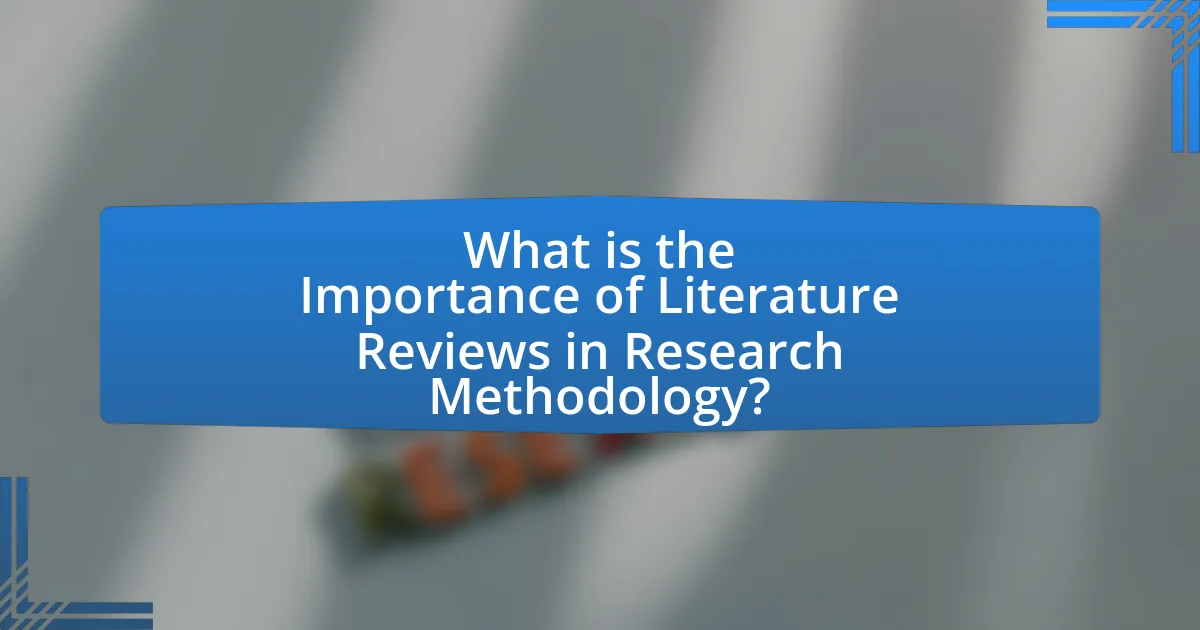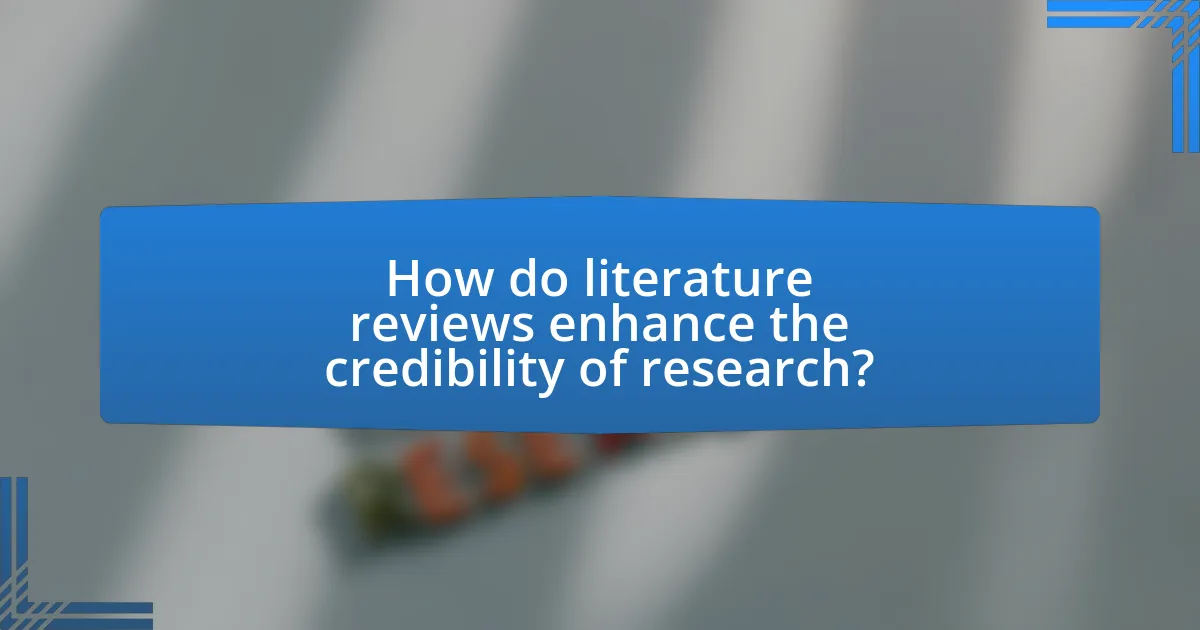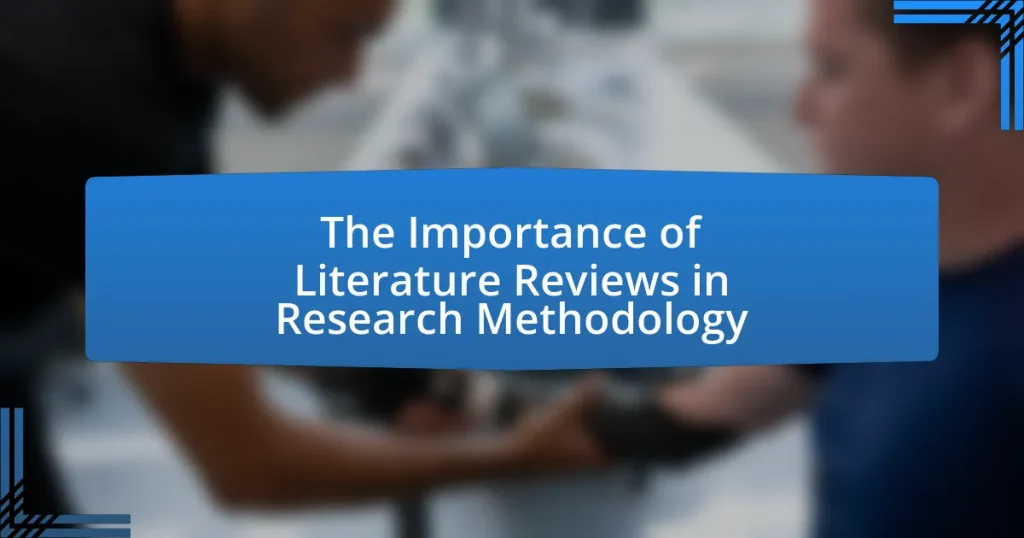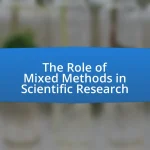Literature reviews are a fundamental component of research methodology, providing a comprehensive overview of existing knowledge on a topic while identifying gaps and establishing a theoretical framework. They enhance the credibility of research by synthesizing previous studies, guiding the formulation of research questions, and ensuring that new inquiries build on established findings. Key components of an effective literature review include a clear research question, systematic source selection, critical analysis, and synthesis of findings. Additionally, literature reviews play a crucial role in contextualizing research, validating methodologies, and influencing research outcomes, ultimately contributing to the advancement of knowledge in various fields.

What is the Importance of Literature Reviews in Research Methodology?
Literature reviews are crucial in research methodology as they provide a comprehensive overview of existing knowledge on a topic, identifying gaps and establishing a theoretical framework. By synthesizing previous studies, literature reviews help researchers understand the context of their work, justify their research questions, and avoid duplication of efforts. Furthermore, they enhance the credibility of the research by grounding it in established findings, as evidenced by a study published in the “Journal of Research Practice,” which highlights that well-conducted literature reviews significantly improve the quality and rigor of research outcomes.
Why are literature reviews essential in the research process?
Literature reviews are essential in the research process because they provide a comprehensive overview of existing knowledge on a specific topic, identifying gaps and guiding future research directions. By synthesizing previous studies, literature reviews help researchers understand the context of their work, ensuring that new research builds on established findings rather than duplicating efforts. Furthermore, they enhance the credibility of research by demonstrating a thorough understanding of the field, which is crucial for securing funding and publication. Studies show that well-conducted literature reviews can significantly increase the impact and relevance of research outcomes, as they align new inquiries with ongoing scholarly conversations.
What role do literature reviews play in establishing research context?
Literature reviews play a critical role in establishing research context by synthesizing existing knowledge and identifying gaps in the literature. They provide a comprehensive overview of relevant studies, theories, and methodologies, which helps researchers situate their work within the broader academic discourse. By analyzing previous research, literature reviews highlight the significance of the current study, justify its relevance, and clarify how it contributes to the field. For instance, a literature review on climate change impacts may reveal insufficient studies on specific regional effects, thereby justifying new research focused on that area. This contextualization is essential for framing research questions and guiding methodological choices.
How do literature reviews contribute to identifying research gaps?
Literature reviews contribute to identifying research gaps by systematically analyzing existing studies and highlighting areas that lack sufficient investigation. Through comprehensive evaluation of published works, literature reviews reveal inconsistencies, unanswered questions, and underexplored topics within a field. For instance, a literature review on climate change impacts may uncover limited research on specific geographic regions or demographic groups, indicating a gap that warrants further exploration. This process not only informs researchers about what has been studied but also guides them in formulating new research questions that address these identified gaps, thereby advancing knowledge in the discipline.
What are the key components of an effective literature review?
An effective literature review consists of several key components: a clear research question, a comprehensive search strategy, critical analysis of sources, synthesis of findings, and identification of gaps in the literature. The research question guides the focus of the review, ensuring relevance and direction. A comprehensive search strategy involves systematically searching databases and selecting relevant studies, which enhances the review’s credibility. Critical analysis of sources assesses the quality and reliability of the literature, while synthesis of findings integrates insights from various studies to present a cohesive understanding of the topic. Finally, identifying gaps in the literature highlights areas for future research, contributing to the advancement of knowledge in the field. These components collectively ensure that the literature review is thorough, relevant, and valuable for informing research methodology.
How should sources be selected for a literature review?
Sources for a literature review should be selected based on their relevance, credibility, and contribution to the research topic. Relevance ensures that the sources directly address the research questions or hypotheses, while credibility involves evaluating the author’s qualifications, the publication’s reputation, and the rigor of the research methodology used. Additionally, selecting sources that provide diverse perspectives enhances the depth of the review. For instance, peer-reviewed journal articles are often prioritized due to their rigorous evaluation process, which adds to their credibility. According to a study published in the “Journal of Research Practice,” using a systematic approach to source selection can significantly improve the quality and comprehensiveness of literature reviews.
What methodologies are commonly used in conducting literature reviews?
Common methodologies used in conducting literature reviews include systematic reviews, meta-analyses, narrative reviews, and scoping reviews. Systematic reviews involve a structured approach to identify, evaluate, and synthesize research studies on a specific topic, ensuring comprehensive coverage and minimizing bias. Meta-analyses quantitatively combine results from multiple studies to derive overall conclusions, enhancing statistical power. Narrative reviews provide a qualitative summary of existing literature, often highlighting trends and gaps without a formal systematic approach. Scoping reviews map the existing literature on a topic to identify key concepts, theories, and evidence gaps, serving as a preliminary assessment before more detailed systematic reviews. These methodologies are essential for establishing a solid foundation for further research and informing practice.

How do literature reviews enhance the credibility of research?
Literature reviews enhance the credibility of research by providing a comprehensive overview of existing knowledge on a topic, which establishes a foundation for new findings. By systematically analyzing and synthesizing previous studies, literature reviews demonstrate the researcher’s understanding of the field and highlight gaps that the new research aims to address. This process not only situates the new research within the broader academic discourse but also allows for the identification of methodological strengths and weaknesses in prior studies, thereby reinforcing the validity of the new research approach. Furthermore, literature reviews often cite peer-reviewed sources, which adds an additional layer of reliability and scholarly rigor to the research, as evidenced by the fact that studies published in reputable journals undergo rigorous evaluation processes.
What impact do literature reviews have on research validity?
Literature reviews significantly enhance research validity by providing a comprehensive overview of existing knowledge and identifying gaps in the literature. They establish a theoretical framework that guides the research design and methodology, ensuring that the study is grounded in established findings. For instance, a systematic review can reveal inconsistencies in previous studies, allowing researchers to refine their hypotheses and methodologies accordingly. This process not only strengthens the credibility of the research but also minimizes biases by incorporating diverse perspectives and findings from multiple sources. Consequently, literature reviews serve as a critical tool for validating research by ensuring that it is informed, relevant, and methodologically sound.
How do literature reviews support the formulation of research questions?
Literature reviews support the formulation of research questions by synthesizing existing knowledge and identifying gaps in the literature. This synthesis allows researchers to understand the current state of research on a topic, which informs the development of specific, relevant questions. For instance, a literature review may reveal that while many studies have explored a particular phenomenon, few have addressed its impact on a specific demographic, thus guiding researchers to formulate questions that fill this gap. By highlighting inconsistencies, trends, and areas needing further exploration, literature reviews provide a solid foundation for crafting focused and meaningful research questions.
What is the relationship between literature reviews and theoretical frameworks?
Literature reviews and theoretical frameworks are interdependent components of research methodology. A literature review synthesizes existing research, identifying gaps and establishing the context for a study, while a theoretical framework provides the underlying principles and theories that guide the research. The literature review informs the theoretical framework by highlighting relevant theories and concepts that have been previously explored, thereby ensuring that the framework is grounded in established knowledge. For example, a study on educational outcomes may review literature on various learning theories, which then shapes the theoretical framework that the research will utilize to analyze data. This relationship ensures that research is both informed by prior work and theoretically sound, enhancing the validity and relevance of the findings.
How can literature reviews influence research outcomes?
Literature reviews significantly influence research outcomes by providing a comprehensive synthesis of existing knowledge, identifying gaps, and guiding future research directions. They enable researchers to build upon established theories and methodologies, ensuring that new studies are grounded in a solid foundation of prior work. For instance, a systematic review can highlight inconsistencies in previous findings, prompting researchers to address these discrepancies in their own studies. Furthermore, literature reviews can enhance the credibility of research by situating it within the broader academic discourse, as evidenced by studies showing that well-conducted literature reviews increase the likelihood of publication in reputable journals.
What are the potential consequences of neglecting literature reviews?
Neglecting literature reviews can lead to significant consequences, including the risk of duplicating existing research, which wastes resources and time. Without a thorough understanding of prior studies, researchers may overlook critical findings, resulting in flawed methodologies or conclusions. For instance, a study published in the Journal of Research Practice highlighted that 30% of research projects failed to build on existing literature, leading to redundant efforts and missed opportunities for innovation. Additionally, neglecting literature reviews can diminish the credibility of research, as it may appear uninformed or disconnected from the academic discourse, ultimately affecting publication chances and scholarly impact.
How do literature reviews aid in the interpretation of research findings?
Literature reviews aid in the interpretation of research findings by providing a comprehensive overview of existing knowledge and contextualizing new results within established frameworks. They synthesize previous studies, highlight gaps in the literature, and identify trends, which helps researchers understand how their findings relate to broader academic conversations. For instance, a literature review can reveal whether similar studies have produced consistent results or if discrepancies exist, guiding researchers in assessing the validity and significance of their own findings. This contextualization is crucial for drawing informed conclusions and making recommendations based on research outcomes.

What best practices should be followed when conducting a literature review?
When conducting a literature review, best practices include defining a clear research question, systematically searching for relevant literature, and critically evaluating the sources. A clear research question guides the scope and focus of the review, ensuring that the literature gathered is pertinent. Systematic searching involves using multiple databases and employing specific keywords to capture a comprehensive range of studies. Critical evaluation of sources assesses the credibility, relevance, and quality of the literature, which is essential for establishing a solid foundation for the research. These practices enhance the reliability and validity of the literature review, ultimately contributing to the overall rigor of the research methodology.
How can researchers ensure a comprehensive literature review?
Researchers can ensure a comprehensive literature review by systematically searching multiple databases and utilizing a variety of keywords and phrases relevant to their research topic. This approach allows them to capture a wide range of studies, theories, and findings that contribute to their understanding of the subject. For instance, using databases such as PubMed, Scopus, and Google Scholar increases the likelihood of uncovering both seminal and recent works in the field. Additionally, employing citation tracking and reviewing reference lists of key articles can reveal further relevant literature. A study by Grant and Booth (2009) in the “Health Information & Libraries Journal” emphasizes the importance of diverse search strategies in enhancing the breadth of literature reviews, demonstrating that comprehensive reviews are more likely to yield robust and reliable conclusions.
What strategies can be employed to organize literature effectively?
To organize literature effectively, researchers can employ strategies such as thematic categorization, chronological organization, and the use of reference management software. Thematic categorization involves grouping literature based on common themes or topics, which helps in identifying trends and gaps in research. Chronological organization arranges literature according to publication dates, allowing researchers to track the evolution of ideas over time. Reference management software, like EndNote or Zotero, streamlines the process of collecting, organizing, and citing sources, enhancing efficiency and accuracy in literature reviews. These strategies are validated by studies indicating that systematic organization improves the clarity and comprehensiveness of literature reviews, ultimately contributing to more robust research methodologies.
How can researchers critically evaluate sources during a literature review?
Researchers can critically evaluate sources during a literature review by assessing the credibility, relevance, and quality of the information presented. They should examine the author’s qualifications, the publication’s reputation, and the methodology used in the research. For instance, a study published in a peer-reviewed journal typically indicates a higher level of scrutiny compared to non-peer-reviewed sources. Additionally, researchers should consider the date of publication to ensure the information is current and relevant to their topic. Evaluating citations and references within the source can also provide insight into the research’s foundation and reliability. By applying these criteria, researchers can ensure they are using high-quality, trustworthy sources in their literature reviews.
What common challenges do researchers face in literature reviews?
Researchers commonly face challenges such as information overload, difficulty in synthesizing diverse sources, and maintaining objectivity during literature reviews. Information overload occurs due to the vast amount of available literature, making it hard to identify relevant studies. Synthesizing diverse sources is challenging because researchers must integrate findings from various methodologies and perspectives, which can lead to conflicting results. Maintaining objectivity is crucial, as personal biases may influence the interpretation of literature, potentially skewing the review’s conclusions. These challenges are well-documented in research methodology literature, emphasizing the need for systematic approaches to mitigate them.
How can researchers overcome biases in literature selection?
Researchers can overcome biases in literature selection by employing systematic review methodologies that include predefined criteria for inclusion and exclusion of studies. This approach minimizes subjective judgment and ensures a comprehensive search across multiple databases, which can reduce the likelihood of cherry-picking favorable studies. For instance, the PRISMA guidelines advocate for transparent reporting and a structured process, which has been shown to enhance the reliability of literature reviews. Additionally, utilizing tools like citation analysis and meta-analysis can help identify and include a broader range of relevant literature, further mitigating bias.
What tools and resources are available to assist in literature reviews?
Numerous tools and resources assist in literature reviews, including reference management software, academic databases, and systematic review guidelines. Reference management software like EndNote, Zotero, and Mendeley helps organize citations and generate bibliographies efficiently. Academic databases such as PubMed, Scopus, and Google Scholar provide access to a vast array of peer-reviewed articles and research papers. Additionally, systematic review guidelines from organizations like the Cochrane Collaboration offer structured methodologies for conducting comprehensive literature reviews. These resources enhance the efficiency and effectiveness of the literature review process, ensuring thorough and organized research.
What practical tips can enhance the quality of literature reviews?
To enhance the quality of literature reviews, researchers should systematically organize their sources, critically evaluate the literature, and synthesize findings effectively. Systematic organization involves categorizing studies by themes or methodologies, which facilitates easier comparison and analysis. Critical evaluation requires assessing the credibility, relevance, and contributions of each source, ensuring that only high-quality literature informs the review. Effective synthesis means integrating findings from various studies to identify trends, gaps, and implications, which strengthens the overall argument and provides a comprehensive understanding of the topic. These practices are supported by guidelines from the American Psychological Association, which emphasize the importance of thoroughness and critical thinking in literature reviews.


